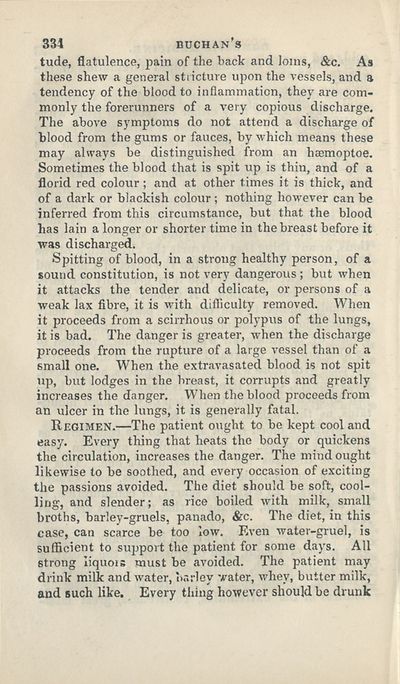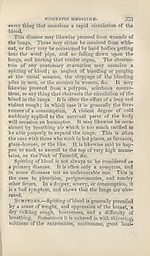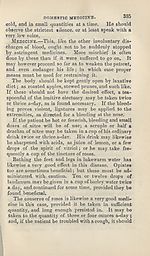Diseases > Domestic medicine
(368)
Download files
Complete book:
Individual page:
Thumbnail gallery: Grid view | List view

tude, flatulence, pain of the back and loins, &c. As
these shew a general stricture upon the vessels, and a
tendency of the blood to inflammation, they are com¬
monly the forerunners of a very copious discharge.
The above symptoms do not attend a discharge of
blood from the gums or fauces, by which means these
may always be distinguished from an haemoptoe.
Sometimes the blood that is spit up is thin, and of a
florid red colour; and at other times it is thick, and
of a dark or blackish colour; nothing however can be
inferred from this circumstance, but that the blood
has lain a longer or shorter time in the breast before it
was discharged.
Spitting of blood, in a strong healthy person, of a
sound constitution, is not very dangerous ; but when
it attacks the tender and delicate, or persons of a
weak lax fibre, it is with difficulty removed. When
it proceeds from a scirrhous or polypus of the lungs,
it is bad. The danger is greater, when the discharge
proceeds from the rupture of a large vessel than of a
small one. When the extravasated blood is not spit
up, but lodges in the breast, it corrupts and greatly
increases the danger. When the blood proceeds from
an ulcer in the lungs, it is generally fatal.
Regimen.—The patient ought to be kept cool and
easy. Every thing that heats the body or quickens
the circulation, increases the danger. The mind ought
likewise to be soothed, and every occasion of exciting
the passions avoided. The diet should be soft, cool-
ling, and slender; as rice boiled with milk, small
broths, barley-gruels, panado, &c. The diet, in this
case, can scarce be too low. Even water-gruel, is
sufficient to support the patient for some days. All
strong liquois must be avoided. The patient may
drink milk and water, barley water, whey, butter milk,
and such like. Every thing however should be drunk
these shew a general stricture upon the vessels, and a
tendency of the blood to inflammation, they are com¬
monly the forerunners of a very copious discharge.
The above symptoms do not attend a discharge of
blood from the gums or fauces, by which means these
may always be distinguished from an haemoptoe.
Sometimes the blood that is spit up is thin, and of a
florid red colour; and at other times it is thick, and
of a dark or blackish colour; nothing however can be
inferred from this circumstance, but that the blood
has lain a longer or shorter time in the breast before it
was discharged.
Spitting of blood, in a strong healthy person, of a
sound constitution, is not very dangerous ; but when
it attacks the tender and delicate, or persons of a
weak lax fibre, it is with difficulty removed. When
it proceeds from a scirrhous or polypus of the lungs,
it is bad. The danger is greater, when the discharge
proceeds from the rupture of a large vessel than of a
small one. When the extravasated blood is not spit
up, but lodges in the breast, it corrupts and greatly
increases the danger. When the blood proceeds from
an ulcer in the lungs, it is generally fatal.
Regimen.—The patient ought to be kept cool and
easy. Every thing that heats the body or quickens
the circulation, increases the danger. The mind ought
likewise to be soothed, and every occasion of exciting
the passions avoided. The diet should be soft, cool-
ling, and slender; as rice boiled with milk, small
broths, barley-gruels, panado, &c. The diet, in this
case, can scarce be too low. Even water-gruel, is
sufficient to support the patient for some days. All
strong liquois must be avoided. The patient may
drink milk and water, barley water, whey, butter milk,
and such like. Every thing however should be drunk
Set display mode to:
![]() Universal Viewer |
Universal Viewer | ![]() Mirador |
Large image | Transcription
Mirador |
Large image | Transcription
| Antiquarian books of Scotland > Diseases > Domestic medicine > (368) |
|---|
| Permanent URL | https://digital.nls.uk/119892558 |
|---|
| Description | Thousands of printed books from the Antiquarian Books of Scotland collection which dates from 1641 to the 1980s. The collection consists of 14,800 books which were published in Scotland or have a Scottish connection, e.g. through the author, printer or owner. Subjects covered include sport, education, diseases, adventure, occupations, Jacobites, politics and religion. Among the 29 languages represented are English, Gaelic, Italian, French, Russian and Swedish. |
|---|

